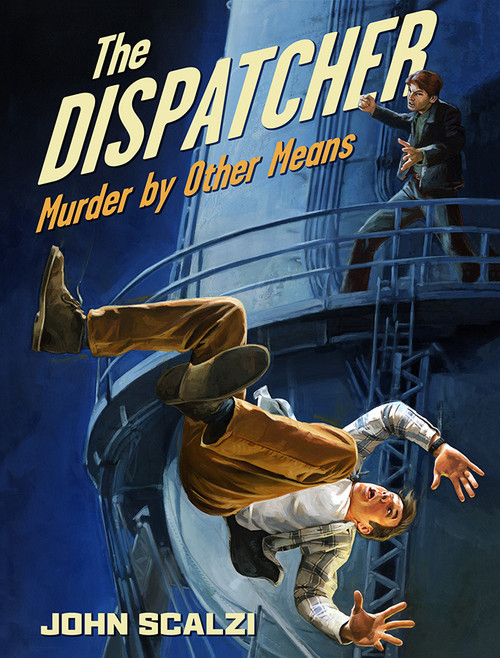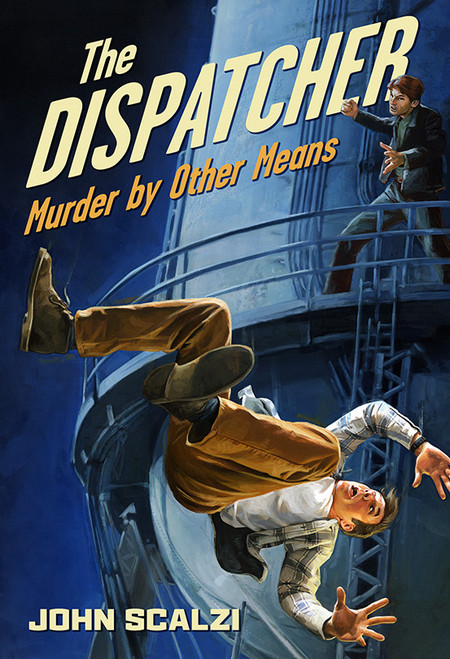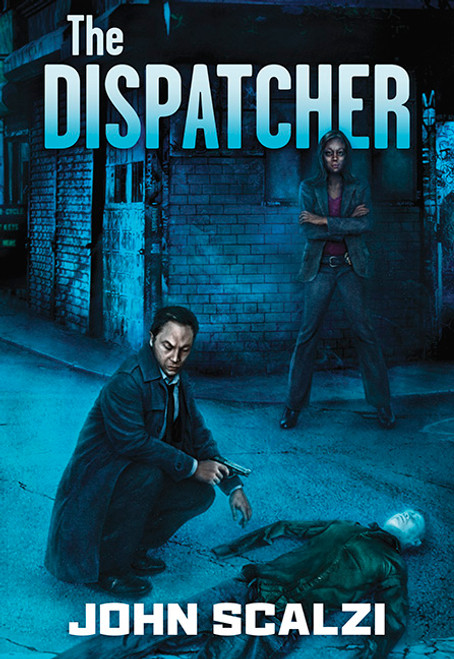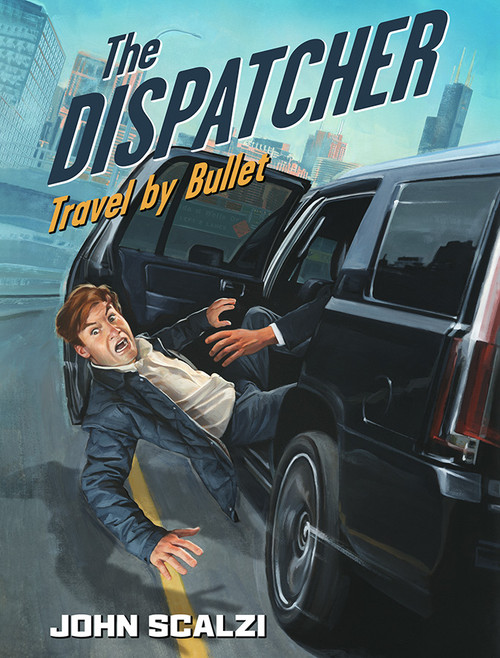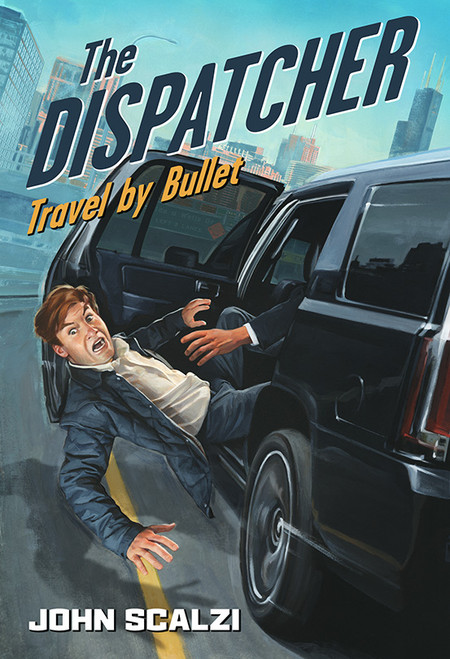Dust jacket illustration by Michael Koelsch
From Hugo-winning author John Scalzi comes an exciting sequel to The New York Times best-selling hit The Dispatcher.
The Dispatcher: Murder by Other Means clocks in at 37,000 words, far longer than the tale that kicked off the series.
Welcome to the new world, in which murder is all but a thing of the past. When someone kills you, 999 times out of 1,000, you instantly come back to life. In this world, there are dispatchers—licensed killers who step in when you’re at risk of a natural or unintentional death. They kill you—so you can live.
Tony Valdez is used to working his job as a dispatcher within the rules of the law and the state. But times are tough, and more and more Tony finds himself riding the line between what’s legal and what will pay his bills. After one of these shady gigs, and after being a witness to a crime gone horribly wrong, Tony discovers that people around him are dying, for reasons that make no sense...and which just may implicate him.
Tony is running out of time: to solve the mystery of these deaths, to keep others from dying, and to keep himself from being a victim of what looks like murder, by other means.
Limited: 2000 signed numbered hardcover copies
From Publishers Weekly:
“With the quirky sequel to The Dispatcher, Scalzi plays with the question of what a future in which murder has become outdated might look like… Scalzi’s decision to blithely ignore the mechanics of his bizarre premise keeps the story simple, encouraging the reader to enjoy the ride without thinking too hard. This is a fun romp…”
The Dispatcher: Murder by Other Means
(excerpt)
“Mister Valdez, Mister Peng here will pay you ten thousand dollars, in cash, to shoot him in the head right now.”
The thing about this moment wasn’t that someone was offering me a large sum of money to pick up a gun and put a hole in their skull with it. The thing about this moment was that this was not the first time in one month I’d been asked to do it.
But it was the first time I’d been asked to do it in the office of a major Chicago law firm, so I had that going for me, which was nice.
The Mr. Peng in question, with a young translator hovering directly behind him, stood by the desk of Lloyd Barnes, senior partner of Wilson Barnes Jimenez and Park. Wilson Barnes’s offices took up three floors at 875 North Michigan, which most people referred to as the John Hancock Center for the same reason that the other very tall Chicago building was the Sears Tower, no matter who had the naming rights. Barnes himself sat at his very large, very modern desk, on which rested a number of intriguing objets d’art, a framed photo of his kids, and a Smith & Wesson M&P handgun, basic police issue.
I looked around the office and then turned to Barnes. He was the one who had summoned me with a promise of a job, shook my hand as I entered his office, and exchanged pleasantries and introductions before stating the nature of the business at hand. It seemed fair to address him first. “Your office has a lovely view of the lake, Mister Barnes,” I said. “It would be a shame to ruin it with blood spatter.”
“If everything goes well, it will only be blood-spattered for a few moments.”
“It might not go well,” I said.
Barnes smiled at this. “It’s a risk I’m willing for you to take.”
“You might be willing to,” I replied. “I’m not sure I am.”
“But this is your job,” Barnes said.
I sighed and looked over to Peng, still standing there quietly while his translator murmured into his ear. “Is there a reason you want me to shoot and kill you, sir?” I asked.
Peng looked uncomfortable after this was translated for him. “I don’t want to die. I just want to be shot,” his translator interpreted after a moment.
I pointed to the Smith & Wesson. “That’s not a surgical instrument. It’s a weapon. This thing will blow out the back of your head, and no matter what else happens, you will die, sir. It’s not going to be simple or pleasant. So you should have a good reason for me to kill you. And I should be able to know what it is.”
Peng looked over at Barnes after this was translated. Barnes nodded at him. “I need to get to Beijing,” Peng said, through his translator.
“There are planes,” I said. “You could be there in fourteen hours. Brains intact.”
“That’s not fast enough,” Barnes said.
I turned back to him. “Then you can explain why. Or I’m leaving.”
“Mister Peng is in competition for a very important business deal in mainland China, and he reached an understanding with a major American bank for its funding,” Barnes said, motioning to Peng. “Unfortunately, a competitor had the same idea and reached a similar understanding with another bank here in Chicago. That competitor is on a plane that departed O’Hare”—and here Barnes checked his watch—“twenty minutes ago. There’s not another flight to Beijing for several hours. The deal is literally first come, first served. Mister Peng needs to get there first. There’s no other option.”
“‘First come, first served’ doesn’t sound like an entirely legitimate way for a major business deal to come together,” I said.
Barnes smiled again. “These are exciting times in a competitive business environment, Mister Valdez. May I call you Tony?”
“Let’s stick to Mister Valdez for now.”
“Fine. As I said, exciting times. And as Mister Peng’s American law firm, we’re committed to helping him achieve his success.”
“You’ll be paid no matter what happens, though,” I said.
“Of course. But if he’s successful, we’ll be paid more,” Barnes said.
Peng spoke again, noticeably curt. “Mister Peng wishes to know what the problem is,” his translator said. “He expected to be done with this by now.”
“The problem is that what you’re asking me to do isn’t actually legal,” I said. “The problem is that if I help you, and something goes wrong, the person who is on the hook is me.”
“We’ve thought of that,” Barnes said.
“Have you.”
“In the event things go wrong, I and Mister Chen here”—Barnes motioned to the translator—“will say that Mister Peng became despondent after failing to convince you to help him.”
I caught the implication of what was carefully not being said. “Is Mister Peng aware of this?” I asked Chen.
“Yes,” he said.
“Ask him to confirm that to me.”
Chen asked the question. Peng responded. “He says that if you do not help him now, he’s ruined anyway.” Peng looked me directly in the eye as Chen said this, and then nodded at the end of it. I nodded back. We understood each other.
“Ten thousand dollars in cash, Mister Valdez,” Barnes said, coming back to the matter at hand.
“Twenty-five thousand,” I said.
Barnes looked a bit shocked. “Excuse me?”
“That’s my fee. For the shooting and for the risk.”
“I just told you we have a cover story for you.”
“It’s not good enough.” I motioned to Peng. “This month I’ve had two other proposals just like this one, for similar amounts of money. This is apparently a hot new trend in travel. I don’t really do jobs like this, Mister Barnes. So if these offers are finding me, then others in my field are also getting offers. If they’re getting offers, then somewhere along the way, someone’s probably gotten sloppy. And when that happens, the police aren’t going to be far behind.”
I addressed the translator. “Mister Chen, are you a citizen?”
“Pardon?” Chen asked.
“Are you a United States citizen?” I asked.
“I’m Chinese,” he said. “I’ve been here since I was three. I have a green card.”
I turned back to Barnes. “The minute Chicago PD sees Mister Chen here, they’re going to get Immigration to lean on him, hard.”
“I won’t tell,” Chen said.
“It’s easy to say that now,” I said. “Let’s see what you have to say when a detective tells you that you’re an accomplice to first-degree murder, and that the best-case scenario is that you’re deported to a country you don’t know or remember.”
Chen shrank back, silent.
“What happened with those other two offers?” Barnes asked.
“I turned them down. Just like I’m going to turn this one down. Unless you meet my price.
“Pay him,” Peng said to Barnes.
“It’s a lot,” Barnes replied.
Peng said something to Chen, his English apparently exhausted. “We’re arguing over a stupid amount of money,” Chen said. “Ten thousand, twenty-five thousand, who cares. I need to get to Beijing now. We’re wasting time.”
Barnes looked over to me. “Well, then. You have your money, Mister Valdez.”
“In cash.”
“It’s in the wall safe. We’ll settle up afterward.”
“Fine,” I said. Then. “Just one more question.”
“What is it?” Barnes asked.
“Why me? I’ve never done work for you before, Mister Barnes.”
“You came recommended. A mutual friend. He said you’d say you didn’t do things like this much, but that was because you’d been lying to yourself about the reasons why.” Barnes leaned back in his chair and spread out his hands. “I’m not here to judge one way or the other. I’m just glad you’re agreeable.”
“The gun’s going to make a lot of noise,” I said.
“I already told my assistant we’d be firing a blank for evidentiary reasons. We won’t be bothered,” Barnes said.
“Unless something goes wrong.”
“Let’s worry about that if it happens.”
I didn’t have anything to say to that. I picked up the gun, checked to make sure it was ready to fire, and then looked around. The office was on a corner with two sides of window glass. One of the other walls was shared with another office. That wouldn’t work. I pointed to an area on the fourth wall that jutted out from the rest of the wall and featured shelves, on which were books and awards. “What’s on the other side of that wall?” I asked.
“I have a private bathroom,” Barnes said.
“Follow me,” I said to Peng, and entered the bathroom. He followed, Chen trailing behind.
“Why are we in here?” Peng asked, through Chen.
“Because it can be hosed down,” I said.
Chen turned green and then translated, stuttering. “I can wait outside,” he said when he finished. He looked like he was about to throw up.
“You probably should,” I said. He nodded numbly and exited.
I’d killed dozens and possibly hundreds of people during my professional career, and each one presented its own set of challenges. The challenge here was to minimize damage and to make it look like it was Peng, not me, pulling the trigger. I thought about it and paced around the bathroom, figuring angles, opening shower doors, and moving things around. Peng watched me as I did this, with some curiosity. He was a cool customer, if nothing else.
When I figured out what I wanted, I positioned Peng, who cooperated. There was a bathrobe on the door, for when Barnes used the shower. I stripped off my shirt and put the robe on, and placed a hand towel over my firing hand. The idea was to minimize gunshot residue on me in case things went poorly. Peng watched everything but didn’t comment. I could tell he was becoming impatient.
“How much English do you know?” I asked.
“A little,” Peng said.
I raised the gun to his temple and placed my index finger, covered by the towel, on the trigger guard. “I’m going to count to three and shoot. Understand? One, two, three, bang.”
“Yes.” Peng nodded curtly.
“Good. One,” I said and pulled the trigger.
- artists_list:
- Michael Koelsch
- authors_list:
- John Scalzi
- binding:
- Hardcover
- book_case:
- None
- book_edition:
- Limited
- book_length:
- 192 pages
- book_type:
- Novella
- country_of_manufacturer:
- United States
- isbn:
- 978-1-64524-017-4
- is_subpress:
- Yes
- manufacturer:
- Subterranean Press
- print_status:
- In Print
- year:
- 2021

